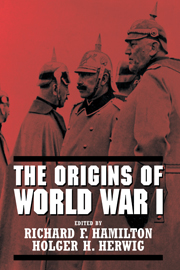Book contents
- Frontmatter
- Contents
- List of Tables and Maps
- Contributors
- Acknowledgments
- 1 World Wars: Definition and Causes
- 2 The European Wars: 1815–1914
- 3 Serbia
- 4 Austria-Hungary
- 5 Germany
- 6 Russia
- 7 France
- 8 Great Britain
- 9 Japan
- 10 The Ottoman Empire
- 11 Italy
- 12 Bulgaria, Romania, and Greece
- 13 The United States
- 14 Why Did It Happen?
- 15 On the Origins of the Catastrophe
- Appendix A Chronology, 1914
- Appendix B Dramatis Personae
- Appendix C Suggested Readings
- Index
8 - Great Britain
Published online by Cambridge University Press: 05 August 2012
- Frontmatter
- Contents
- List of Tables and Maps
- Contributors
- Acknowledgments
- 1 World Wars: Definition and Causes
- 2 The European Wars: 1815–1914
- 3 Serbia
- 4 Austria-Hungary
- 5 Germany
- 6 Russia
- 7 France
- 8 Great Britain
- 9 Japan
- 10 The Ottoman Empire
- 11 Italy
- 12 Bulgaria, Romania, and Greece
- 13 The United States
- 14 Why Did It Happen?
- 15 On the Origins of the Catastrophe
- Appendix A Chronology, 1914
- Appendix B Dramatis Personae
- Appendix C Suggested Readings
- Index
Summary
For the British, the First World War has particular significance. It is by far the bloodiest conflict in the nation's history. It resulted in a dramatic decline in Great Britain's economic strength and a great, if more gradual, diminution in its international standing. Perhaps for these reasons it remains something of a national obsession, the intensity of which has, if anything, increased in recent years.
Yet for all the war's prominence in national consciousness, the British debate on its origins, especially when compared with that in Germany, has been desultory and muted. The British are still horrified by their losses and have tended to regard the competence of much of their military leadership as at least open to question. But they generally feel that they have little need to reproach themselves over the war's causation. Since 1918, indeed, few historians of any nationality have accused the British of having instigated the war. Great Britain was not directly involved in the quarrel in the Balkans that triggered it, and it is undeniable that the British government tried hard to defuse the crisis, offering mediation.
Particularly since the publication of David Lloyd George's memoirs in the 1930s, some people have argued that Sir Edward Grey, the British foreign secretary, was culpable for failing to deter German aggression. According to this analysis, Grey might have faced Germany down had he categorically declared, in July 1914, Great Britain's readiness to go to war if France were attacked.
- Type
- Chapter
- Information
- The Origins of World War I , pp. 266 - 299Publisher: Cambridge University PressPrint publication year: 2003
- 3
- Cited by

